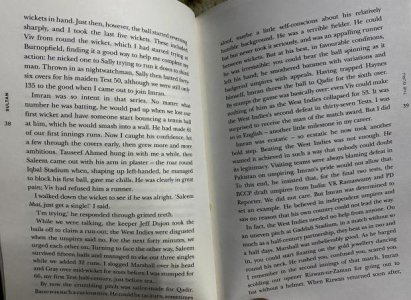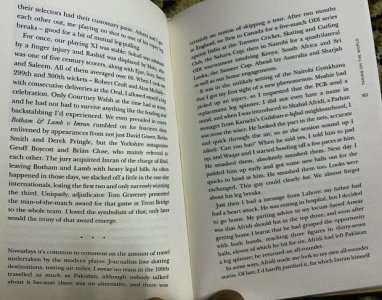Corridor of Uncertainty
First Class Captain
- Joined
- Jan 10, 2009
- Runs
- 5,134
- Post of the Week
- 4
I have to admit, I cried.
For two reasons.
First, in this book, I see the Wasim I knew when he bowled fireballs.
Not the carefree Wasim laughing away in ESPN commentary boxes or the one selling washing powder like a used car salesman. Not even the Wasim in post match interviews who laughed away defeats.
This book reminded me of the Wasim I remember expending the very last ounces of energy in the 3rd test at St John's, having already bowled 60 overs in the game, 11 wickets to his name, and then see it all become fruitless at the end; the one who got Botham, Lamb and Lewis with naked aggression and unbridled talent rarely found in one place, that too on world's biggest stage; the one who used to bounce Richards, Lara, Ganguly and Ponting off the same length that he would use to take the top of off, off. The same Wasim who would hit the final six in Nehru cup and waltz off to the pavilion, and the one who took hattricks against batsmen who knew what was coming but were powerless to stop it.
It was unexpectedly emotional to meet that Wasim again, the snarling, angry, triumphant, troubled, berating, magical man with a lightening run up and a flashing arm who lorded the 90s like no other.
Second, this book is also a soul destroying look into Pakistan cricket's unfulfilled promise. Nothing captures it more than the 90s themselves - a decade that promised so much and yielded so little. And not just in cricket. For a Pakistani and a cricket lover, it makes for desperate reading, like a bad movie on a loop you are powerless to stop.
For all his happy persona, Wasim is a deeply troubled man. This book extensively captures match fixing allegations and all the characters associated with it - players, PCB chairmen, judges, commissions, powerful bookies, shady characters. I won't talk about my judgment of it as the reader can make their own mind about it. All I see is how much it impacted his emotional health and how much damage it caused to Pakistan cricket.
Add to that, the cast of players he played with - and Wasim doesn't hold back his opinions on anyone whether good or bad. He talks us through the 14 captain changes that occurred in less than a decade, the machinations on and off the field, the role of lobbies and powerful influences, the hangers on and leeches in PCB and beyond. There is no other cricketing team in the world that is so paralyzed before they face the first ball.
He lays bare his own lifestyle - drugs, partying, women, fame, favors - in a way so open and so in your face you can't help but feel he is daring the world to take him on. Isn't that how he used to be with the ball in hand? He talks about his troubled relationships, the death of his wife, the guilt and regret he still has in his heart about his wife and his sons and the many bouts of depression he endured during his life.
It is a very complex read.
I also found the role of Imran in all this an amazing insight into the man. I am bowled over by the many hats Imran wore as captain, mentor, guide to players, the ethos of winning, the mentoring and oversight he provided to Pakistan cricket and how he changed odds with very poor cards to play. If this is how he was at cricket, one can then see how he rose to the top job in Pakistan. Similarly, there are deep insights into Miandad, Anwar, Inzamam, Afridi, the various PCB appointees and others - delivered with cutting transparency.
Wasim as a commentator is so easy to ignore. It's very hard to find insights when someone is just reading scorecards.
Agree with him or not, Wasim in this book is hard to ignore.
Most people read snippets in media designed to sell books and make their minds about the book and its author. That is a mistake. Some of the finest sports books I have read suffered from this - such as Andre Aggassi's autobiography where the book launch focused on his drug use - while the book was so so much more.
Until you read the book, you will miss out on everything Wasim is about.
In many ways, 'Sultan' has left me distraught - because Pakistan cricket is the face of Pakistan, just like PIA used to be. It is rotten to the core. It is being kept afloat by the talent of a few good people. I despair for Babar and his men. Unlike any other team, they are defanged before they hit the ground.
For two reasons.
First, in this book, I see the Wasim I knew when he bowled fireballs.
Not the carefree Wasim laughing away in ESPN commentary boxes or the one selling washing powder like a used car salesman. Not even the Wasim in post match interviews who laughed away defeats.
This book reminded me of the Wasim I remember expending the very last ounces of energy in the 3rd test at St John's, having already bowled 60 overs in the game, 11 wickets to his name, and then see it all become fruitless at the end; the one who got Botham, Lamb and Lewis with naked aggression and unbridled talent rarely found in one place, that too on world's biggest stage; the one who used to bounce Richards, Lara, Ganguly and Ponting off the same length that he would use to take the top of off, off. The same Wasim who would hit the final six in Nehru cup and waltz off to the pavilion, and the one who took hattricks against batsmen who knew what was coming but were powerless to stop it.
It was unexpectedly emotional to meet that Wasim again, the snarling, angry, triumphant, troubled, berating, magical man with a lightening run up and a flashing arm who lorded the 90s like no other.
Second, this book is also a soul destroying look into Pakistan cricket's unfulfilled promise. Nothing captures it more than the 90s themselves - a decade that promised so much and yielded so little. And not just in cricket. For a Pakistani and a cricket lover, it makes for desperate reading, like a bad movie on a loop you are powerless to stop.
For all his happy persona, Wasim is a deeply troubled man. This book extensively captures match fixing allegations and all the characters associated with it - players, PCB chairmen, judges, commissions, powerful bookies, shady characters. I won't talk about my judgment of it as the reader can make their own mind about it. All I see is how much it impacted his emotional health and how much damage it caused to Pakistan cricket.
Add to that, the cast of players he played with - and Wasim doesn't hold back his opinions on anyone whether good or bad. He talks us through the 14 captain changes that occurred in less than a decade, the machinations on and off the field, the role of lobbies and powerful influences, the hangers on and leeches in PCB and beyond. There is no other cricketing team in the world that is so paralyzed before they face the first ball.
He lays bare his own lifestyle - drugs, partying, women, fame, favors - in a way so open and so in your face you can't help but feel he is daring the world to take him on. Isn't that how he used to be with the ball in hand? He talks about his troubled relationships, the death of his wife, the guilt and regret he still has in his heart about his wife and his sons and the many bouts of depression he endured during his life.
It is a very complex read.
I also found the role of Imran in all this an amazing insight into the man. I am bowled over by the many hats Imran wore as captain, mentor, guide to players, the ethos of winning, the mentoring and oversight he provided to Pakistan cricket and how he changed odds with very poor cards to play. If this is how he was at cricket, one can then see how he rose to the top job in Pakistan. Similarly, there are deep insights into Miandad, Anwar, Inzamam, Afridi, the various PCB appointees and others - delivered with cutting transparency.
Wasim as a commentator is so easy to ignore. It's very hard to find insights when someone is just reading scorecards.
Agree with him or not, Wasim in this book is hard to ignore.
Most people read snippets in media designed to sell books and make their minds about the book and its author. That is a mistake. Some of the finest sports books I have read suffered from this - such as Andre Aggassi's autobiography where the book launch focused on his drug use - while the book was so so much more.
Until you read the book, you will miss out on everything Wasim is about.
In many ways, 'Sultan' has left me distraught - because Pakistan cricket is the face of Pakistan, just like PIA used to be. It is rotten to the core. It is being kept afloat by the talent of a few good people. I despair for Babar and his men. Unlike any other team, they are defanged before they hit the ground.







